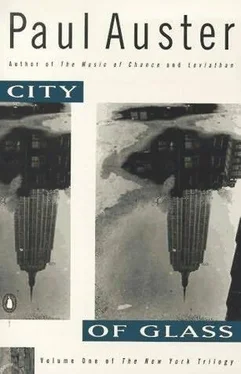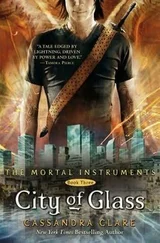Paul Auster - City of Glass
Здесь есть возможность читать онлайн «Paul Auster - City of Glass» весь текст электронной книги совершенно бесплатно (целиком полную версию без сокращений). В некоторых случаях можно слушать аудио, скачать через торрент в формате fb2 и присутствует краткое содержание. Жанр: Современная проза, на английском языке. Описание произведения, (предисловие) а так же отзывы посетителей доступны на портале библиотеки ЛибКат.
- Название:City of Glass
- Автор:
- Жанр:
- Год:неизвестен
- ISBN:нет данных
- Рейтинг книги:5 / 5. Голосов: 1
-
Избранное:Добавить в избранное
- Отзывы:
-
Ваша оценка:
- 100
- 1
- 2
- 3
- 4
- 5
City of Glass: краткое содержание, описание и аннотация
Предлагаем к чтению аннотацию, описание, краткое содержание или предисловие (зависит от того, что написал сам автор книги «City of Glass»). Если вы не нашли необходимую информацию о книге — напишите в комментариях, мы постараемся отыскать её.
City of Glass — читать онлайн бесплатно полную книгу (весь текст) целиком
Ниже представлен текст книги, разбитый по страницам. Система сохранения места последней прочитанной страницы, позволяет с удобством читать онлайн бесплатно книгу «City of Glass», без необходимости каждый раз заново искать на чём Вы остановились. Поставьте закладку, и сможете в любой момент перейти на страницу, на которой закончили чтение.
Интервал:
Закладка:
He retraced his path along 107th Street, turned left on Broadway, and began walking uptown, looking for a suitable place to eat. A bar did not appeal to him tonight-eating in the dark, the press of boozy chatter-although normally he might have welcomed it. As he crossed 112th Street, he saw that the Heights Luncheonette was still open and decided to go in. It was a brightly lit yet dreary place, with a large rack of girlie magazines on one wall, an area for stationery supplies, another area for newspapers, several tables for patrons, and a long Formica counter with swivel stools. A tall Puerto Rican man in a white cardboard chefs hat stood behind the counter. It was his job to make the food, which consisted mainly of gristle-studded hamburger patties, bland sandwiches with pale tomatoes and wilted lettuce, milkshakes, egg creams, and buns. To his right, ensconced behind the cash register, was the boss, a small balding man with curly hair and a concentration camp number tattooed on his forearm, lording it over his domain of cigarettes, pipes, and cigars. He sat there impassively, reading the night-owl edition of the next morning's Daily News.
The place was almost deserted at that hour. At the back table sat two old men in shabby clothes, one very fat and the other very thin, intently studying the racing forms. Two empty coffee cups sat on the table between them. In the foreground, facing the magazine rack, a young student stood with an open magazine in his hands, staring at a picture of a naked woman. Quinn sat down at the counter and ordered a hamburger and a coffee. As the counterman swung into action, he spoke over his shoulder to Quinn.
"Did you see game tonight, man?"
"I missed it. Anything good to report?"
"What do you think?"
For several years Quinn had been having the same conversation with this man, whose name he did not know. Once, when he had been in the luncheonette, they had talked about baseball, and now, each time Quinn came in, they continued to talk about it. In the winter, the talk was of trades, predictions, memories. During the season, it was always the most recent game. They were both Mets fans, and the hopelessness of that passion had created a bond between them.
The counterman shook his head. "First two times up, Kingman hits solo shots," he said. "Boom, boom. Big mothers-all the way to the moon. Jones is pitching good for once and things don't look too bad. It's two to one, bottom of the ninth. Pittsburgh gets men on second and third, one out, so the Mets go to the bullpen for Allen. He walks the next guy to load them up. The Mets bring the comers in for a force at home, or maybe they can get the double lay if it's hit up the middle. Peña comes up and chicken-shits a little grounder to first and the fucker goes through Kingman's legs. Two men score, and that's it, bye-bye New York.
"Dave Kingman is a turd," said Quinn, biting into his hamburger.
"But watch out for Foster," said the counterman.
"Foster's washed up. A has-been. A mean-faced bozo." Quinn chewed his food carefully, feeling with his tongue for stray bits of bone. "They should ship him back to Cincinnati by express mail.”
"Yeah," said the counterman. "But they'll be tough. Better than last year, anyway."
"I don't know," said Quinn, taking another bite. "It looks good on paper, but what do they really have? Steams is always getting hurt. They have minor leaguers at second and short, and Brooks can't keep his mind on the game. Mookie's good, but he's raw, and they can't even decide who to put in right. There's still Rusty, of course, but he's too fat to run anymore. And as for the pitching, forget it. You and I could go over to Shea tomorrow and get hired as the top two starters."
"Maybe I make you the manager," said the counterman. "You could tell those fuckers where to get off."
"You bet your bottom dollar," said Quinn.
After he finished eating, Quinn wandered over to the stationery shelves. A shipment of new notebooks had come in, and the pile was impressive, a beautiful array of blues and greens and reds and yellows. He picked one up and saw that the pages had the narrow lines he preferred. Quinn did all his writing with a pen, using a typewriter only for final drafts, and he was always on the lookout for good spiral notebooks. Now that he had embarked on the Stillman case, he felt that a new notebook was in order. It would be helpful to have a separate place to record his thoughts, his observations, and his questions. In that way, perhaps, things might not get out of control.
He looked through the pile, trying to decide which one -to pick. For reasons that were never made clear to him, he suddenly felt an irresistible urge for a particular red notebook at the bottom. He pulled it out and examined it, gingerly fanning the pages with his thumb. He was at a loss to explain to himself why he found it so appealing. It was a standard eight-and-a-half-by-eleven notebook with one hundred pages. But something about it seemed to call out to him-as if its unique destiny in the world was to hold the words that came from his pen. Almost embarrassed by the intensity of his feelings, Quinn tucked the red notebook under his arm, walked over to the cash register, and bought it.
Back in his apartment a quarter of an hour later, Quinn removed the photograph of Stillman and the check from his jacket pocket and placed them carefully on his desk. He cleared the debris from the surface-dead matches, cigarette butts, eddies of ash, spent ink cartridges, a few coins, ticket stubs, doodles, a dirty handkerchief-and put the red notebook in the center. Then he drew the shades in the room, took off all his clothes, and sat down at the desk. He had never done this before, but it somehow seemed appropriate to be naked at this moment. He sat there for twenty or thirty seconds, trying not to move, trying not to do anything but breathe. Then he opened the red notebook. He picked up his pen and wrote his initials, D.Q. (for Daniel Quinn), on the first page. It was the first time in more than five years that he had put his own name in one of his notebooks. He stopped to consider this fact for a moment but then dismissed it as irrelevant. He turned the page. For several moments he studied its blankness, wondering if he was not a bloody fool. Then he pressed his pen against the top line and made the first entry in the red notebook.
Stillman's face. Or: Stillman's face as it was twenty years ago. Impossible to know whether the face tomorrow will resemble it. It is certain, however, that this is not the face of a madman. Or is this not a legitimate statement? To my eyes, at least, it seems benign, if not downright pleasant. A hint of tenderness around the mouth even. More than likely blue eyes, with a tendency to water. Thin hair even then, so perhaps gone now, and what remains gray, or even white. He bears an odd familiarity: the meditative type, no doubt high-strung, someone who might stutter, fight with himself to stem the flood of words rushing from his mouth.
Little Peter. Is it necessary for me to imagine it, or can I accept it on faith? The darkness. To, think of myself in that room, screaming. I am reluctant. Nor do I think I even want to understand it. To what end? This is not a story, after all. It is a fact, something happening in the world, and I am supposed to do a job, one little thing, and I have said yes to it. If all goes well, it should even be quite simple. I have not been hired to understand-merely to act. This is something new. To keep it in mind, at all costs.
And yet, what is it that Dupin says in Poe? "An identification of the reasoner's intellect with that of his opponent." But here it would apply to Stillman senior. Which is probably even worse.
As for Virginia, I am in a quandary. Not just the kiss, which might be explained by any number of reasons; not what Peter said about her, which is unimportant. Her marriage? Perhaps. The complete incongruity of it. Could it be that she's in it for the money? Or somehow working in collaboration with Stillman? That would change everything. But, at the same time, it makes no sense. For why would she have hired me? To have a witness to her apparent good intentions? Perhaps. But that seems too complicated. And yet: why do I feel she is not to be trusted?
Читать дальшеИнтервал:
Закладка:
Похожие книги на «City of Glass»
Представляем Вашему вниманию похожие книги на «City of Glass» списком для выбора. Мы отобрали схожую по названию и смыслу литературу в надежде предоставить читателям больше вариантов отыскать новые, интересные, ещё непрочитанные произведения.
Обсуждение, отзывы о книге «City of Glass» и просто собственные мнения читателей. Оставьте ваши комментарии, напишите, что Вы думаете о произведении, его смысле или главных героях. Укажите что конкретно понравилось, а что нет, и почему Вы так считаете.












